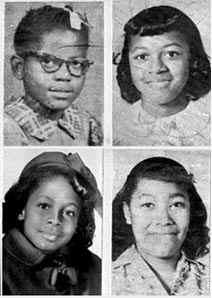Known as "Bombingham" for the 50 racially motivated bombings that took place there between 1945 and 1962, Birmingham, Alabama remained completely segregated in the early 1960s and was a prime focus of the civil rights movement. As part of the movement, African American churches served as its spiritual backbone and were used as meeting places for the black community. Because of this, they were a major target for segregationist attacks.

The 16th Street Baptist Church was at the center of Birmingham's African American community, hosting mass meetings and serving as the staging area for multiple civil rights marches. On Sunday, September 15, 1963, Ku Klux Klan members bombed the Church. A box of dynamite with a timer was placed under the front steps steps of the church, near the basement, and was set to go off during Sunday prayers. That morning twenty-six children were in the church's basement assembly room preparing for the service when the bomb exploded.
Four girls, Addie Mae Collins (age 14), Denise McNair (age 11), Carole Robertson (age 14), and Cynthia Wesley (age 14), were killed in the bomb blast. The girls had been dressed in their Sunday best, ready to sing and act as ushers at the adult service, and only a few minutes before the explosion they had been together in the basement women's room, talking about the new school year. Addie Mae Collins' younger sister, Sarah, had been with the four girls when the bomb exploded, but survived the attack as did the other 22 children in the basement.
The deaths of the four girls followed by the assassination of President John F. Kennedy two months later gave birth to a tide of grief and anger--a surge of emotional momentum that galvanized the civil rights movement and ensured the passage of the 1964 Civil Rights Act.
Last updated: March 23, 2016
